了不起的盖茨比chapter1
了不起的盖茨比:章节详解
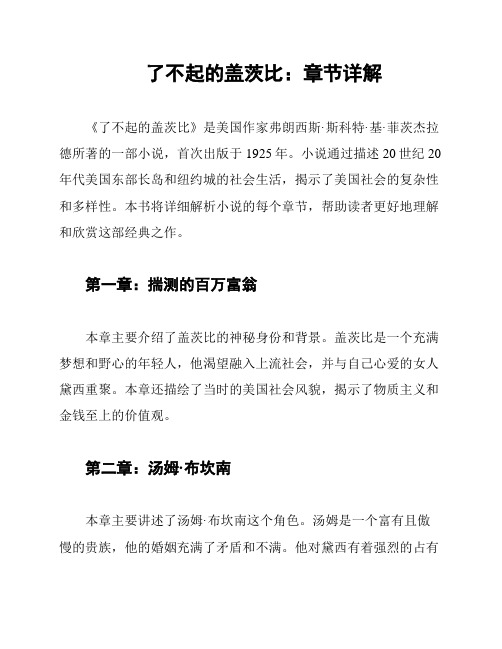
了不起的盖茨比:章节详解《了不起的盖茨比》是美国作家弗朗西斯·斯科特·基·菲茨杰拉德所著的一部小说,首次出版于1925年。
小说通过描述20世纪20年代美国东部长岛和纽约城的社会生活,揭示了美国社会的复杂性和多样性。
本书将详细解析小说的每个章节,帮助读者更好地理解和欣赏这部经典之作。
第一章:揣测的百万富翁本章主要介绍了盖茨比的神秘身份和背景。
盖茨比是一个充满梦想和野心的年轻人,他渴望融入上流社会,并与自己心爱的女人黛西重聚。
本章还描绘了当时的美国社会风貌,揭示了物质主义和金钱至上的价值观。
第二章:汤姆·布坎南本章主要讲述了汤姆·布坎南这个角色。
汤姆是一个富有且傲慢的贵族,他的婚姻充满了矛盾和不满。
他对黛西有着强烈的占有欲,并试图阻止她和盖茨比的重逢。
本章通过汤姆的形象展示了当时美国社会上流阶层的虚伪和道德沦丧。
第三章:黛西·布坎南本章着重描绘了黛西这个角色。
黛西是一个美丽、聪明且有魅力的女性,她身处上流社会,却对现实生活感到厌倦。
她对盖茨比的爱慕和怀念,使她在故事中成为了盖茨比追求梦想的象征。
本章揭示了女性在当时社会中的困境和无奈。
第四章:盖茨比的盛宴本章描述了盖茨比在长岛举办的一场奢华派对。
他希望通过这场盛宴吸引黛西的注意,并向上流社会展示自己的财富和地位。
然而,派对最终以混乱和失望告终,盖茨比的梦想似乎越来越遥远。
本章反映了美国社会中金钱与梦想的矛盾关系。
第五章:黛西的拜访本章讲述了黛西在盖茨比的邀请下来到派对现场。
她在盖茨比面前表现出了同情和理解,但在面对汤姆时,她又回到了现实。
本章展示了黛西内心的挣扎和矛盾,以及她在上流社会中的无奈。
第六章:盖茨比的悲剧本章揭示了盖茨比梦想的破灭。
他为了追求黛西,不断努力提高自己的社会地位,却最终发现金钱并不能买到真正的爱情。
本章通过对盖茨比悲剧命运的描绘,批判了当时美国社会的价值观。
第七章:结局本章描述了盖茨比悲剧的结局。
对了不起的盖茨比章节的深度解读
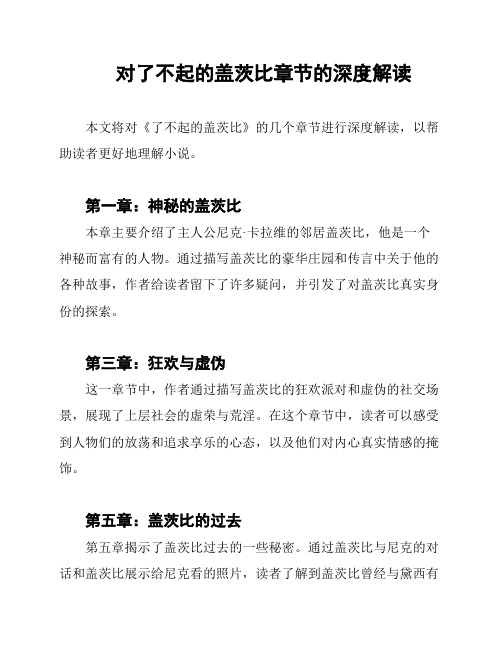
对了不起的盖茨比章节的深度解读
本文将对《了不起的盖茨比》的几个章节进行深度解读,以帮助读者更好地理解小说。
第一章:神秘的盖茨比
本章主要介绍了主人公尼克·卡拉维的邻居盖茨比,他是一个神秘而富有的人物。
通过描写盖茨比的豪华庄园和传言中关于他的各种故事,作者给读者留下了许多疑问,并引发了对盖茨比真实身份的探索。
第三章:狂欢与虚伪
这一章节中,作者通过描写盖茨比的狂欢派对和虚伪的社交场景,展现了上层社会的虚荣与荒淫。
在这个章节中,读者可以感受到人物们的放荡和追求享乐的心态,以及他们对内心真实情感的掩饰。
第五章:盖茨比的过去
第五章揭示了盖茨比过去的一些秘密。
通过盖茨比与尼克的对话和盖茨比展示给尼克看的照片,读者了解到盖茨比曾经与黛西有
过一段感情。
这一章节中,作者通过回忆和对话的方式,揭示了盖茨比对黛西的深情和对过去的执着。
第七章:破碎的梦想
第七章是小说中一个重要的转折点,也是一个悲剧的开始。
在这一章节中,黛西的丈夫汤姆揭露了盖茨比的真实身份和他的非法手段,导致黛西与盖茨比的关系破裂。
这一章节中,作者通过描述人物们的心理变化和对话,展现了他们的痛苦和失望。
结论
通过对《了不起的盖茨比》几个章节的深度解读,我们可以更好地理解小说中的人物和情节。
作者通过描写盖茨比的神秘身份、上层社会的虚伪、盖茨比对黛西的执着和破碎的梦想,探讨了财富与爱情、梦想与现实之间的冲突。
阅读这些章节,读者可以深入思考人性、社会和梦想的复杂关系。
解码《了不起的盖茨比》:最新版情节梳理

解码《了不起的盖茨比》:最新版情节梳理本文对《了不起的盖茨比》最新版的情节进行梳理,帮助读者更好地理解故事发展。
以下是情节的简要概述:1. 第一章故事以主人公尼克·卡拉威为叙述者展开。
尼克搬到纽约,住在长岛上的西蒙斯家旁边,与富裕的邻居盖茨比成为朋友。
尼克首次参加盖茨比的派对,见到了许多社交名流。
2. 第二章尼克受邀参加汤姆·布坎南的晚宴,结识了汤姆的妻子黛西和她的朋友乔丹·贝克。
尼克发现汤姆有婚外情,而黛西对此似乎心知肚明。
3. 第三章尼克再次参加盖茨比的派对,发现派对上的人们都对盖茨比的身世和财富充满好奇。
尼克与盖茨比共进晚餐,了解到盖茨比曾与黛西有过一段恋情。
4. 第四章尼克与盖茨比一同前往纽约市,盖茨比希望尼克能帮他再次见到黛西。
他们来到汤姆和黛西的住所,汤姆开始怀疑盖茨比的动机。
尼克了解到盖茨比过去的一些秘密。
5. 第五章盖茨比举办了一场盛大的派对,但只邀请了尼克、黛西和乔丹。
在派对上,黛西对盖茨比的生活方式感到不满,她开始怀疑盖茨比是否真的能给她带来幸福。
6. 第六章尼克了解到盖茨比的真实身份和他追求黛西的动机。
盖茨比曾是一个贫穷的军官,为了能与黛西在一起,他通过非法手段获得了财富。
7. 第七章盖茨比举办了一场巨大的派对,邀请了许多贵族和名流。
汤姆怀疑盖茨比的背景并展开调查,最终揭示了盖茨比的秘密。
黛西对盖茨比的失望和汤姆的怀疑导致了悲剧的发生。
8. 第八章故事回到了尼克的视角,他见证了盖茨比的下场和黛西与汤姆的团聚。
尼克感到对盖茨比的遭遇深感悲伤,对当时的社会也心生厌倦。
9. 第九章尼克与盖茨比的父亲一起参加了盖茨比的葬礼。
尼克与汤姆碰面,两人之间的关系变得紧张。
故事以尼克对美国梦的思考和对盖茨比的怀念结束。
这是《了不起的盖茨比》最新版的情节梳理,希望对读者有所帮助。
---注:本文所述情节仅为梳理,具体细节请参阅原著。
了不起的盖茨比各章节介绍
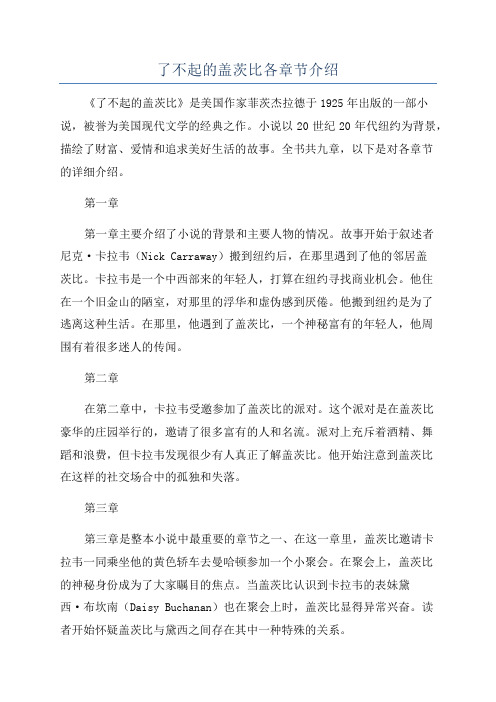
了不起的盖茨比各章节介绍《了不起的盖茨比》是美国作家菲茨杰拉德于1925年出版的一部小说,被誉为美国现代文学的经典之作。
小说以20世纪20年代纽约为背景,描绘了财富、爱情和追求美好生活的故事。
全书共九章,以下是对各章节的详细介绍。
第一章第一章主要介绍了小说的背景和主要人物的情况。
故事开始于叙述者尼克·卡拉韦(Nick Carraway)搬到纽约后,在那里遇到了他的邻居盖茨比。
卡拉韦是一个中西部来的年轻人,打算在纽约寻找商业机会。
他住在一个旧金山的陋室,对那里的浮华和虚伪感到厌倦。
他搬到纽约是为了逃离这种生活。
在那里,他遇到了盖茨比,一个神秘富有的年轻人,他周围有着很多迷人的传闻。
第二章在第二章中,卡拉韦受邀参加了盖茨比的派对。
这个派对是在盖茨比豪华的庄园举行的,邀请了很多富有的人和名流。
派对上充斥着酒精、舞蹈和浪费,但卡拉韦发现很少有人真正了解盖茨比。
他开始注意到盖茨比在这样的社交场合中的孤独和失落。
第三章第三章是整本小说中最重要的章节之一、在这一章里,盖茨比邀请卡拉韦一同乘坐他的黄色轿车去曼哈顿参加一个小聚会。
在聚会上,盖茨比的神秘身份成为了大家瞩目的焦点。
当盖茨比认识到卡拉韦的表妹黛西·布坎南(Daisy Buchanan)也在聚会上时,盖茨比显得异常兴奋。
读者开始怀疑盖茨比与黛西之间存在其中一种特殊的关系。
第四章第四章是一章回忆章节,它揭示了盖茨比过去的真相。
卡拉韦和盖茨比一起驾车去纽约,盖茨比向卡拉韦讲述他的故事。
盖茨比真实的名字是詹姆斯·盖茨,他是一个贫穷的农场工人的儿子。
他爱上了年轻的黛西,但因为自己贫穷无法娶她。
因此,他决定追求财富,成为一个有钱人,以便能够与黛西再度相聚。
第五章在第五章里,盖茨比终于与黛西重逢,并且邀请她去参观他的豪宅。
盖茨比努力展现自己的财富和地位,以期望能够吸引黛西回到他的身边。
然而,他发现时间已改变了黛西,她对他的改变感到失望。
详尽剖析:最新版《了不起的盖茨比》情节
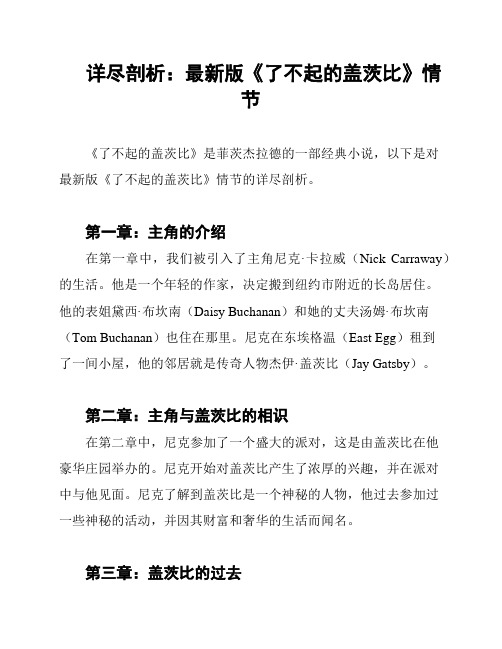
详尽剖析:最新版《了不起的盖茨比》情节《了不起的盖茨比》是菲茨杰拉德的一部经典小说,以下是对最新版《了不起的盖茨比》情节的详尽剖析。
第一章:主角的介绍在第一章中,我们被引入了主角尼克·卡拉威(Nick Carraway)的生活。
他是一个年轻的作家,决定搬到纽约市附近的长岛居住。
他的表姐黛西·布坎南(Daisy Buchanan)和她的丈夫汤姆·布坎南(Tom Buchanan)也住在那里。
尼克在东埃格温(East Egg)租到了一间小屋,他的邻居就是传奇人物杰伊·盖茨比(Jay Gatsby)。
第二章:主角与盖茨比的相识在第二章中,尼克参加了一个盛大的派对,这是由盖茨比在他豪华庄园举办的。
尼克开始对盖茨比产生了浓厚的兴趣,并在派对中与他见面。
尼克了解到盖茨比是一个神秘的人物,他过去参加过一些神秘的活动,并因其财富和奢华的生活而闻名。
第三章:盖茨比的过去第三章揭示了盖茨比过去的一些秘密。
我们得知他的真名叫做詹姆斯·盖茨,曾经是一个贫穷的军官。
他与黛西相爱,但因为贫穷而无法与她结婚。
为了追求财富,盖茨比参与了非法活动,并通过各种手段积累了巨额财富。
第四章:盖茨比与黛西的重逢在第四章中,盖茨比与黛西重逢,这是他们多年来的第一次见面。
盖茨比决定展示他的财富和奢华的生活方式,以重新吸引黛西的注意。
他邀请尼克和黛西一起参观他的豪宅,并向他们展示了他的珍贵收藏。
第五章:盖茨比与黛西的关系加深第五章中,盖茨比与黛西的关系逐渐加深。
他们开始秘密见面,并计划结束黛西与汤姆的婚姻。
盖茨比希望黛西能为他离婚,但黛西对此持犹豫态度。
尼克作为他们的朋友,也开始意识到这段关系可能带来的问题和后果。
第六章:盖茨比的真相第六章揭示了盖茨比的真实身份和他财富的来源。
我们了解到他的财富并非来自合法途径,而是通过走私和其他非法活动获得的。
尼克开始怀疑盖茨比的真实动机,并开始重新评估他对盖茨比的看法。
了不起的盖茨比第一回尼克卡拉威的到来对盖茨比的好奇

了不起的盖茨比第一回尼克卡拉威的到来对盖茨比的好奇尼克卡拉威是一位年轻的人,来到了纽约市的长岛玛龙家族的达马吉欧庄园,这是一个远离城市喧嚣的地方。
这个庄园与盖茨比的豪华别墅仅一河之隔。
这天晚上,尼克参加了盖茨比举办的盛大派对,他对这个传奇人物充满了好奇。
尼克第一次踏入盖茨比的别墅时,惊叹于这幢华丽的建筑和豪华的陈设。
他的目光被那一件件珍奇的艺术品所吸引,每一处都展现着财富和奢华。
尽管他对盖茨比知之甚少,但他觉得这个人一定有很多不为人知的故事。
在派对上,尼克发现盖茨比是一个引人注目且神秘的人物。
他穿着一件华丽的礼服,优雅地与客人交谈,但却保持着一种疏离感。
人们用各种传闻和猜测来描述他,一些人说他是从废墟中崛起的富豪,而另一些人则说他是个盗贼。
尽管有很多关于盖茨比的传闻,但尼克对这些谣言持保留态度。
他决定自己去寻找真相。
于是,他开始与盖茨比交往,并逐渐发现他独特的魅力。
盖茨比慷慨地向他展示了他的财富和生活方式,但也透露出孤独和渴望被接纳的一面。
尼克惊叹于盖茨比的矛盾之处。
他是一个虚无主义者,却对美梦和爱情抱有无限渴望。
他无私地爱着黛西,一个有着浓烈香水味的女人,她成为了盖茨比无法摆脱的过去和未来。
尼克看到了盖茨比内心的脆弱和悲伤,也感受到了他对黛西的深情。
在尼克与盖茨比的互动中,他开始理解盖茨比所追求的那个“美国梦”。
盖茨比相信通过奋斗和努力,每个人都可以实现自己的梦想。
他是一个迷失在现实与幻想之间的人,他将自己打造成一个看似完美无缺的人物,只为了能够得到黛西的爱。
尼克通过与盖茨比的交往,深入了解到了他的过去。
他了解到盖茨比出生于一个贫穷的农村家庭,但他通过自己的努力和机智追求着更好的生活。
他觉得金钱和地位是他追求的目标,但实际上他追求的是一种被社会认可和重新爱情的认同。
他梦想着能够回到过去的时光,重新开始和黛西的美好生活。
随着故事的发展,尼克越来越被盖茨比所吸引。
他对盖茨比的好奇心变成了一种崇拜和敬意。
了不起的盖茨比:章节详解
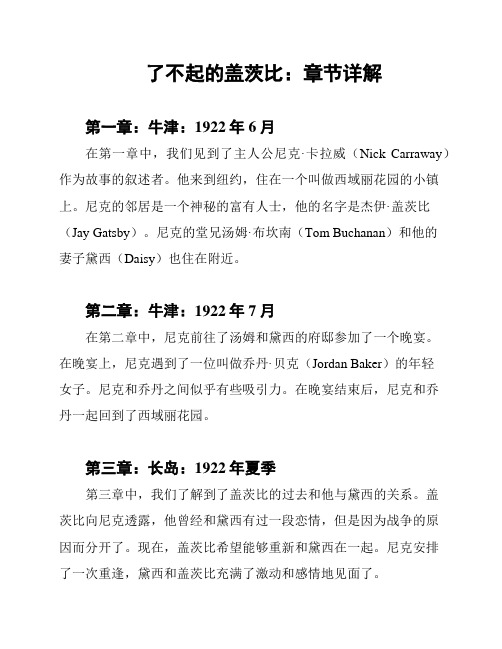
了不起的盖茨比:章节详解第一章:牛津:1922年6月在第一章中,我们见到了主人公尼克·卡拉威(Nick Carraway)作为故事的叙述者。
他来到纽约,住在一个叫做西域丽花园的小镇上。
尼克的邻居是一个神秘的富有人士,他的名字是杰伊·盖茨比(Jay Gatsby)。
尼克的堂兄汤姆·布坎南(Tom Buchanan)和他的妻子黛西(Daisy)也住在附近。
第二章:牛津:1922年7月在第二章中,尼克前往了汤姆和黛西的府邸参加了一个晚宴。
在晚宴上,尼克遇到了一位叫做乔丹·贝克(Jordan Baker)的年轻女子。
尼克和乔丹之间似乎有些吸引力。
在晚宴结束后,尼克和乔丹一起回到了西域丽花园。
第三章:长岛:1922年夏季第三章中,我们了解到了盖茨比的过去和他与黛西的关系。
盖茨比向尼克透露,他曾经和黛西有过一段恋情,但是因为战争的原因而分开了。
现在,盖茨比希望能够重新和黛西在一起。
尼克安排了一次重逢,黛西和盖茨比充满了激动和感情地见面了。
第四章:长岛:1922年夏季在第四章中,我们了解到了盖茨比的神秘身世和他的财富来源。
尼克参加了盖茨比举办的一场盛大派对,那里来了很多名人和富豪。
尼克遇到了盖茨比的生意伙伴沃尔夫什尔(Wolfsheim),他向尼克透露了盖茨比的一些过去。
尼克开始对盖茨比的真实身份感到好奇。
第五章:长岛:1922年秋天在第五章中,盖茨比与黛西之间的关系进一步加深。
盖茨比向黛西展示了他的豪宅和财富,试图让黛西感受到他的热情和对她的爱。
尼克注意到他们之间的亲密和黛西对盖茨比的感激之情。
然而,尼克也开始怀疑盖茨比的真实动机和他的过去。
第六章:长岛:1922年秋天第六章中,我们了解到了盖茨比年轻时的生活和他的追求黛西的动机。
盖茨比告诉尼克他曾经是一个贫穷的年轻人,但通过努力工作和运气,他成为了一个富有的人。
尼克开始对盖茨比的坦诚感到钦佩,但也对他的过去和他的计划感到担忧。
了不起的盖茨比第一章英文概要
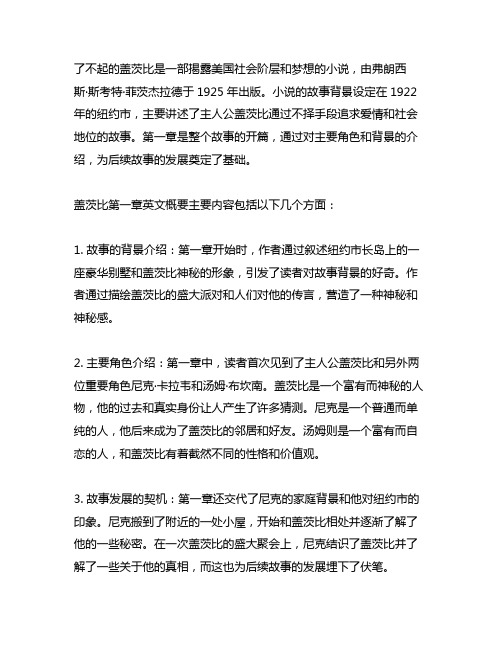
了不起的盖茨比是一部揭露美国社会阶层和梦想的小说,由弗朗西斯·斯考特·菲茨杰拉德于1925年出版。
小说的故事背景设定在1922年的纽约市,主要讲述了主人公盖茨比通过不择手段追求爱情和社会地位的故事。
第一章是整个故事的开篇,通过对主要角色和背景的介绍,为后续故事的发展奠定了基础。
盖茨比第一章英文概要主要内容包括以下几个方面:1. 故事的背景介绍:第一章开始时,作者通过叙述纽约市长岛上的一座豪华别墅和盖茨比神秘的形象,引发了读者对故事背景的好奇。
作者通过描绘盖茨比的盛大派对和人们对他的传言,营造了一种神秘和神秘感。
2. 主要角色介绍:第一章中,读者首次见到了主人公盖茨比和另外两位重要角色尼克·卡拉韦和汤姆·布坎南。
盖茨比是一个富有而神秘的人物,他的过去和真实身份让人产生了许多猜测。
尼克是一个普通而单纯的人,他后来成为了盖茨比的邻居和好友。
汤姆则是一个富有而自恋的人,和盖茨比有着截然不同的性格和价值观。
3. 故事发展的契机:第一章还交代了尼克的家庭背景和他对纽约市的印象。
尼克搬到了附近的一处小屋,开始和盖茨比相处并逐渐了解了他的一些秘密。
在一次盖茨比的盛大聚会上,尼克结识了盖茨比并了解了一些关于他的真相,而这也为后续故事的发展埋下了伏笔。
盖茨比第一章英文概要通过介绍背景、角色和故事契机,成功地吸引了读者的注意,并为后续故事的发展做好了铺垫。
随着故事的深入,读者将逐渐了解主人公盖茨比的真实面貌和他追求爱情和社会地位的故事,而第一章的内容则为整个故事的发展起到了承上启下的作用。
第一章介绍了盖茨比这位神秘而富有的主人公,以及他的邻居尼克和尼克的表亲汤姆。
盖茨比的形象在第一章中被渲染得神秘而吸引人,他的财富和盛大的聚会给人留下了深刻的印象。
尼克通过和盖茨比的相处,开始了解了一些关于盖茨比真实身份和过去的信息,而这也为后续故事的发展埋下了伏笔。
在盖茨比第一章的基础上,故事的情节将进一步展开。
了不起的盖茨比各章节介绍
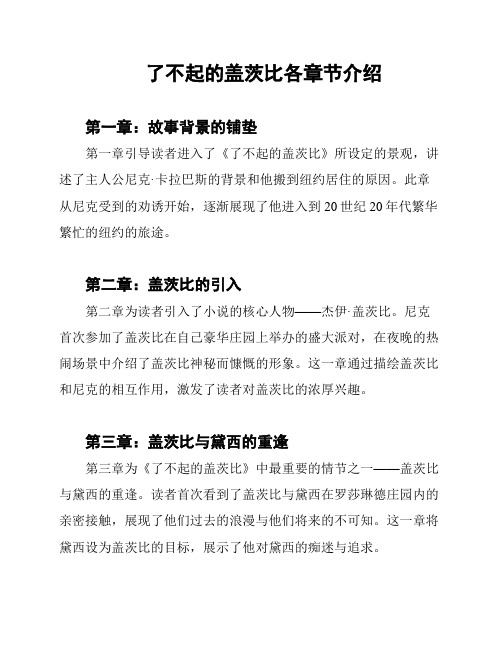
了不起的盖茨比各章节介绍第一章:故事背景的铺垫第一章引导读者进入了《了不起的盖茨比》所设定的景观,讲述了主人公尼克·卡拉巴斯的背景和他搬到纽约居住的原因。
此章从尼克受到的劝诱开始,逐渐展现了他进入到20世纪20年代繁华繁忙的纽约的旅途。
第二章:盖茨比的引入第二章为读者引入了小说的核心人物——杰伊·盖茨比。
尼克首次参加了盖茨比在自己豪华庄园上举办的盛大派对,在夜晚的热闹场景中介绍了盖茨比神秘而慷慨的形象。
这一章通过描绘盖茨比和尼克的相互作用,激发了读者对盖茨比的浓厚兴趣。
第三章:盖茨比与黛西的重逢第三章为《了不起的盖茨比》中最重要的情节之一——盖茨比与黛西的重逢。
读者首次看到了盖茨比与黛西在罗莎琳德庄园内的亲密接触,展现了他们过去的浪漫与他们将来的不可知。
这一章将黛西设为盖茨比的目标,展示了他对黛西的痴迷与追求。
第四章:盖茨比的过去揭开第四章揭示了关于盖茨比过去的一些细节。
通过介绍盖茨比的个人历史,以及他和丹尼斯·盖茨比的联系,读者逐渐了解到盖茨比为何执着于重返黛西身边。
此章同时还揭示了纽约的社会阶层和上流社会圈子的不尽人意之处。
第五章:盖茨比与黛西的短暂幸福第五章展现了盖茨比和黛西短暂的幸福时光。
盖茨比盼望了许久,他们终于在此章重逢,并度过了一段令人愉快的时光。
然而,读者也能感受到这种幸福是多么脆弱和短暂。
第六章:盖茨比的交代与透露第六章揭示了盖茨比身世的一些不寻常之处。
读者了解到盖茨比的富有并非来自正当手段,以及他如何改头换面以适应上流社会。
通过盖茨比和尼克的一次深夜对话,读者窥探到盖茨比渴望那些他拥有的事物能够改变过去,使得他获得更加纯粹的幸福。
第七章:灾难和混乱的开始第七章开始了小说的部分。
盖茨比决定展示他给黛西的豪宅,并邀请她和汤姆一同参观。
这次聚会成为小说中关键的场景,揭示了黛西对盖茨比的真实感情以及汤姆的嫉妒和憎恨。
这一章中的场景和对话为后续剧情埋下了伏笔。
《了不起的盖茨比》PDF英文版

Chapter 1 In my younger and more vulnerable years my father gave me some advice that I’ve been turning over in my mind ever since. “Whenever you feel like criticizing any one” he told me “just remember that all the people in this world haven’t had the advantages that you’ve had.” He didn’t say any more but we’ve always been unusually communicative in a reserved way and I understood that he meant a great deal more than that. In consequence I’m inclined to reserve all judgments a habit that has opened up many curious natures to me and also made me the victim of not a few veteran bores. The abnormal mind is quick to detect and attach itself to this quality when it appears in a normal person and so it came about that in college I was unjustly accused of being a politician because I was privy to the secret griefs of wild unknown men. Most of the confidences were unsought—frequently I have feigned sleep preoccupation or a hostile levity when I realized by some unmistakable sign that an intimate revelation was quivering on the horizon for the intimate revelations of young men or at least the terms in which they express them are usually plagiaristic and marred by obvious suppressions. Reserving judgments is a matter of infinite hope. I am still a little afraid of missing something if I forget that as my father snobbishly suggested and I snobbishly repeat a sense of the fundamental decencies is parcelled out unequally at birth. And after boasting this way of my tolerance I come to the admission that it has a limit. Conduct may be founded on the hard rock or the wet marshes but after a certain point I don’t care what it’s founded on. When I came back from the East last autumn I felt that I wanted the world to be in uniform and at a sort of moral attention forever I wanted no more riotous excursions with privileged glimpses into the human heart. Only Gatsby the man who gives his name to this book was exempt from my reaction—Gatsby who represented everything for which I have an unaffected scorn. If personality is an unbroken series of successful gestures then there was something gorgeous about him some heightened sensitivity to the promises of life as if he were related to one of those intricate machines that register earthquakes ten thousand miles away. This responsiveness had nothing to do with that flabby impressionability which is dignified under the name of the “creative temperament.”—it was an extraordinary gift for hope a romantic readiness such as I have never found in any other person and which it is not likely I shall ever find again. No—Gatsby turned out all right at the end it is what preyed on Gatsby what foul dust floated in the wake of his dreams that temporarily closed out my interest in the abortive sorrows and short-winded elations of men. My family have been prominent well-to-do people in this Middle Western city for three generations. The Carraways are something of a clan and we have a tradition that we’re descended from the Dukes of Buccleuch but the actual founder of my line w as my grandfather’s brother who came here in fifty-one sent a substitute to the Civil War and started the wholesale hardware business that my father carries on to-day. I never saw this great-uncle but I’m supposed to look like him—with special reference to the rather hard-boiled painting that hangs in father’s office I graduated from New Haven in 1915 just a quarter of a century after my father and a little later I participated in that delayed Teutonic migration known as the Great War. I enjoyed the counter-raid so thoroughly that I came back restless. Instead of being the warm centre of the world the Middle West now seemed like the ragged edge of the universe—so I decided to go East and learn the bond business. Everybody I knew was in the bond business so I supposed it could support one more single man. All my aunts and uncles talked it over as if they were choosing a prep school for me and finally said“Why—ye—es” with very grave hesitant faces. Father agreed to finance me for a year and after various delays I came East permanently I thought in the spring of twenty-two. The practical thing was to find rooms in the city but it was a warm season and I had just left a country of wide lawns and friendly trees so when a young man at the office suggested that we take a house together in a commuting town it sounded like a great idea. He found the house a weather-beaten cardboard bungalow at eighty a month but at the last minute the firm ordered him to Washington and I went out to the country alone. I had a dog—at least I had him for a few days until he ran away—and an old Dodge and a Finnish woman who made my bed and cooked breakfast and muttered Finnish wisdom to herself over the electric stove. It was lonely for a day or so until one morning some man more recently arrived than I stopped me on the road. “How do you get to West Egg village” he asked helplessly. I told him. And as I walked on I was lonely no longer. I was a guide a pathfinder an original settler. He had casually conferred on me the freedom of the neighborhood. And so with the sunshine and the great bursts of leaves growing on the trees just as things grow in fast movies I had that familiar conviction that life was beginning over again with the summer. There was so much to read for one thing and so much fine health to be pulled down out of the young breath-giving air. I bought a dozen volumes on banking and credit and investment securities and they stood on my shelf in red and gold like new money from the mint promising to unfold the shining secrets that only Midas and Morgan and Maecenas knew. And I had the high intention of reading many other books besides. I was rather literary in college—one year I wrote a series of very solemn and obvious editorials for the “Yale News.”—and now I was going to bring back all such things into my life and become again that most limited of all specialists the “well-rounded man.” This isn’t just an epigram—life is much more successfully looked at from a single window after all. It was a matter of chance that I should have rented a house in one of the strangest communities in North America. It was on that slender riotous island which extends itself due east of New York—and where there are among other natural curiosities two unusual formations of land. Twenty miles from the city a pair of enormous eggs identical in contour and separated only by a courtesy bay jut out into the most domesticated body of salt water in the Western hemisphere the great wet barnyard of Long Island Sound. they are not perfect ovals—like the egg in the Columbus story they are both crushed flat at the contact end—but their physical resemblance must be a source of perpetual confusion to the gulls that fly overhead. to the wingless a more arresting phenomenon is their dissimilarity in every particular except shape and size. I lived at West Egg the—well the less fashionable of the two though this is a most superficial tag to express the bizarre and not a little sinister contrast between them. my house was at the very tip of the egg only fifty yards from the Sound and squeezed between two huge places that rented for twelve or fifteen thousand a season. the one on my right was a colossal affair by any standard—it was a factual imitation of some Hotel de Ville in Normandy with a tower on one side spanking new under a thin beard of raw ivy and a marble swimming pool and more than forty acres of lawn and garden. it was Gatsby’s mansion. Or rather as I didn’t know Mr. Gatsby it was a mansion inhabited by a gentleman of that name. My own house was an eyesore but it was a small eyesore and it had been overlooked so I had a view of the water a partial view of my neighbor’s lawn and the consoling proximity of millionaires—all for eighty dollars a month. Across the courtesy bay the white palaces of fashionable East Egg glittered along the water and thehistory of the summer really begins on the evening I drove over there to have dinner with the Tom Buchanans. Daisy was my second cousin once removed and I’d known Tom in college. And just after the war I spent two days with them in Chicago. Her husband among various physical accomplishments had been one of the most powerful ends that ever played football at New Haven—a national figure in a way one of those men who reach such an acute limited excellence at twenty-one that everything afterward savors of anti-climax. His family were enormously wealthy—even in college his freedom with money was a matter for reproach—but now he’d left Chicago and come East in a fashion that rather took your breath away: for instance he’d brought do wn a string of polo ponies from Lake Forest. it was hard to realize that a man in my own generation was wealthy enough to do that. Why they came East I don’t know. They had spent a year in France for no particular reason and then drifted here and there unrestfully wherever people played polo and were rich together. This was a permanent move said Daisy over the telephone but I didn’t believe it—I had no sight into Daisy’s heart but I felt that Tom would drift on forever seeking a little wistfully for the dramatic turbulence of some irrecoverable football game. And so it happened that on a warm windy evening I drove over to East Egg to see two old friends whom I scarcely knew at all. Their house was even more elaborate than I expected a cheerful red-and-white Georgian Colonial mansion overlooking the bay. The lawn started at the beach and ran toward the front door for a quarter of a mile jumping over sun-dials and brick walks and burning gardens—finally when it reached the house drifting up the side in bright vines as though from the momentum of its run. The front was broken by a line of French windows glowing now with reflected gold and wide open to the warm windy afternoon and Tom Buchanan in riding clothes was standing with his legs apart on the front porch. He had changed since his New Haven years. Now he was a sturdy straw-haired man of thirty with a rather hard mouth and a supercilious manner. Two shining arrogant eyes had established dominance over his face and gave him the appearance of always leaning aggressively forward. Not even the effeminate swank of his riding clothes could hide the enormous power of that body—he seemed to fill those glistening boots until he strained the top lacing and you could see a great pack of muscle shifting when his shoulder moved under his thin coat. It was a body capable of enormous leverage—a cruel body. His speaking voice a gruff husky tenor added to the impression of fractiousness he conveyed. There was a touch of paternal contempt in it even toward people he liked—and there were men at New Haven who had hated his guts. “Now don’t think my opinion on these matters is final” he seemed to say “just because I’m stronger and more of a man than you are.” We were in the same senior society and while we were never intimate I always had the impression that he approved of me and wanted me to like him with some harsh defiant wistfulness of his own. We talked for a few minutes on the sunny porch. “I’ve got a nice place here” he said his eyes flashing about restlessly. Turning me around by one arm he moved a broad flat hand along the front vista including in its sweep a sunken Italian garden a half acre of deep pungent roses and a snub-nosed motor-boat that bumped the tide offshore. “It belonged to Demaine the oil man.” He turned me aro und again politely and abruptly. “We’ll go inside.” We walked through a high hallway into a bright rosy-colored space fragilely bound into the house by French windows at either end. The windows were ajar and gleaming white against the fresh grass outside that seemed to grow a little way into the house. A breeze blew through the room blew curtains in at one end and out the otherlike pale flags twisting them up toward the frosted wedding-cake of the ceiling and then rippled over the wine-colored rug making a shadow on it as wind does on the sea. The only completely stationary object in the room was an enormous couch on which two young women were buoyed up as though upon an anchored balloon. They were both in white and their dresses were rippling and fluttering as if they had just been blown back in after a short flight around the house. I must have stood for a few moments listening to the whip and snap of the curtains and the groan of a picture on the wall. Then there was a boom as Tom Buchanan shut the rear windows and the caught wind died out about the room and the curtains and the rugs and the two young women ballooned slowly to the floor. The younger of the two was a stranger to me. She was extended full length at her end of the divan completely motionless and with her chin raised a little as if she were balancing something on it which was quite likely to fall. If she saw me out of the corner of her eyes she gave no hint of it—indeed I was almost surprised into murmuring an apology for having disturbed her by coming in. The other girl Daisy made an attempt to rise—she leaned slightly forward with a conscientious expression—then she laughed an absurd charming little laugh and I laughed too and came forward into the room. “I’mp-paralyzed with happiness.” She l aughed again as if she said something very witty and held my hand for a moment looking up into my face promising that there was no one in the world she so much wanted to see. That was a way she had. She hinted in a murmur that the surname of the balancing girl was Baker. I’ve heard it said that Daisy’s murmur was only to make people lean toward her an irrelevant criticism that made it no less charming. At any rate Miss Baker’s lips fluttered she nodded at me almost imperceptibly and then quickly tipped her head back again—the object she was balancing had obviously tottered a little and given her something of a fright. Again a sort of apology arose to my lips. Almost any exhibition of complete self-sufficiency draws a stunned tribute from me.I looked back at my cousin who began to ask me questions in her low thrilling voice. It was the kind of voice that the ear follows up and down as if each speech is an arrangement of notes that will never be played again. Her face was sad and lovely with bright things in it bright eyes and a bright passionate mouth but there was an excitement in her voice that men who had cared for her found difficult to forget: a singing compulsion a whispered “Listen” a promise that she had done gay exciting things just a while since and that there were gay exciting things hovering in the next hour. I told her how I had stopped off in Chicago for a day on my way East and how a dozen people had sent their love through me. “Do they miss me” she cried ecstatically. “The whole town is desolate. All the cars have the left rear wheel painted black as a mourning wreath and there’s a persistent wail all night along the north shore.” “How gorgeous Let’s go back Tom. To-morrow” Then she added irrelevantly: “You ought to see the baby.” “I’d like to.” “She’s asleep. She’s three years old. Haven’t you ever seen her” “Never.” “Well you ought to see her. She’s——” Tom Buchanan who had been hovering restlessly about the room stopped and rested his hand on my shoulder. “What you doing Nick” “I’m a bond man.” “Who with” I told him. “Never heard of them” he remarked decisively. This annoyed me. “You will” I answered shortly. “You will if you stay in the East.” “Oh I’ll stay in the East don’t you worry” he said glancing at Daisy and then back at me as if he were alert for something more. “I’d be a God damned fool to live anywhere else.” At this point Miss Baker said: “Absolutely” with such suddenness that I started—it was the first word she uttered since I came into the room. Evidently it surprised her as much as it didme for she yawned and with a series of rapid deft movements stood up into the room. “I’m stiff” she complained “I’ve been lying on that sofa for as long as .。
了不起的盖茨比第一章英文概要
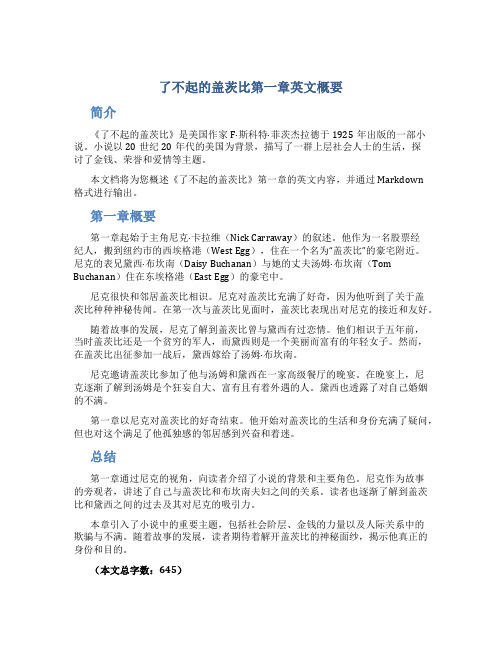
了不起的盖茨比第一章英文概要简介《了不起的盖茨比》是美国作家F·斯科特·菲茨杰拉德于1925年出版的一部小说。
小说以20世纪20年代的美国为背景,描写了一群上层社会人士的生活,探讨了金钱、荣誉和爱情等主题。
本文档将为您概述《了不起的盖茨比》第一章的英文内容,并通过Markdown格式进行输出。
第一章概要第一章起始于主角尼克·卡拉维(Nick Carraway)的叙述。
他作为一名股票经纪人,搬到纽约市的西埃格港(West Egg),住在一个名为“盖茨比”的豪宅附近。
尼克的表兄黛西·布坎南(Daisy Buchanan)与她的丈夫汤姆·布坎南(Tom Buchanan)住在东埃格港(East Egg)的豪宅中。
尼克很快和邻居盖茨比相识。
尼克对盖茨比充满了好奇,因为他听到了关于盖茨比种种神秘传闻。
在第一次与盖茨比见面时,盖茨比表现出对尼克的接近和友好。
随着故事的发展,尼克了解到盖茨比曾与黛西有过恋情。
他们相识于五年前,当时盖茨比还是一个贫穷的军人,而黛西则是一个美丽而富有的年轻女子。
然而,在盖茨比出征参加一战后,黛西嫁给了汤姆·布坎南。
尼克邀请盖茨比参加了他与汤姆和黛西在一家高级餐厅的晚宴。
在晚宴上,尼克逐渐了解到汤姆是个狂妄自大、富有且有着外遇的人。
黛西也透露了对自己婚姻的不满。
第一章以尼克对盖茨比的好奇结束。
他开始对盖茨比的生活和身份充满了疑问,但也对这个满足了他孤独感的邻居感到兴奋和着迷。
总结第一章通过尼克的视角,向读者介绍了小说的背景和主要角色。
尼克作为故事的旁观者,讲述了自己与盖茨比和布坎南夫妇之间的关系。
读者也逐渐了解到盖茨比和黛西之间的过去及其对尼克的吸引力。
本章引入了小说中的重要主题,包括社会阶层、金钱的力量以及人际关系中的欺骗与不满。
随着故事的发展,读者期待着解开盖茨比的神秘面纱,揭示他真正的身份和目的。
(本文总字数:645)。
最新版《了不起的盖茨比》情节梳理
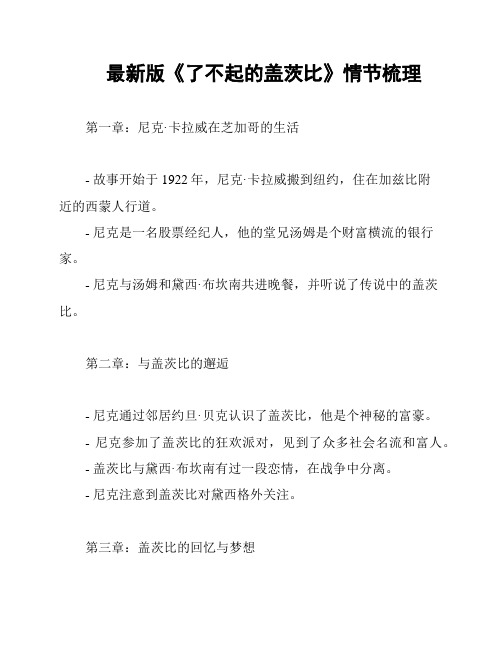
最新版《了不起的盖茨比》情节梳理第一章:尼克·卡拉威在芝加哥的生活- 故事开始于1922年,尼克·卡拉威搬到纽约,住在加兹比附近的西蒙人行道。
- 尼克是一名股票经纪人,他的堂兄汤姆是个财富横流的银行家。
- 尼克与汤姆和黛西·布坎南共进晚餐,并听说了传说中的盖茨比。
第二章:与盖茨比的邂逅- 尼克通过邻居约旦·贝克认识了盖茨比,他是个神秘的富豪。
- 尼克参加了盖茨比的狂欢派对,见到了众多社会名流和富人。
- 盖茨比与黛西·布坎南有过一段恋情,在战争中分离。
- 尼克注意到盖茨比对黛西格外关注。
第三章:盖茨比的回忆与梦想- 盖茨比开始向尼克讲述他的往事,他的真实身份和背景变得扑朔迷离。
- 盖茨比告诉尼克他曾与黛西约会,并展示了一些对他们之间的情感的证据。
- 盖茨比坚信自己可以回到过去,重拾与黛西的感情。
第四章:盖茨比与黛西的再会- 盖茨比请尼克帮忙安排与黛西的再会。
- 盖茨比与黛西的再会非常愉快,他们恢复了过去的感情。
- 盖茨比展示了他的豪宅、财富和对黛西的爱。
第五章:黛西的决定- 黛西开始有所动摇,她对于自己的婚姻和与盖茨比的关系产生矛盾。
- 黛西在尼克的生日派对上离开汤姆,并与盖茨比发生了争吵。
- 盖茨比迫切希望黛西离婚与他结婚,但黛西犹豫不决。
第六章:回忆与真实性- 尼克开始回顾盖茨比的过去,揭示了他的真实身份和财富来源。
- 盖茨比实际上是一个普通人,为了追求黛西而建立了一个虚假的形象。
- 尼克意识到黛西的虚荣心可能会破坏盖茨比的梦想。
第七章:巅峰与坠落- 盖茨比决定为了黛西做任何事,包括承担黛西的罪行。
- 尼克揭示了黛西和盖茨比的真相,但黛西为了保护自己拒绝承认。
- 汤姆揭发了盖茨比对黛西的迷恋。
第八章:悲剧的发生- 黛西的丈夫汤姆支持黛西与他离婚,但他却暗中与盖茨比的情敌威尔逊合谋。
- 在威尔逊的报复行动中,盖茨比被错误地认为是威尔逊杀害其妻子的人。
了不起的盖茨比第一回盖茨比的神秘身份

了不起的盖茨比第一回盖茨比的神秘身份众所周知,《了不起的盖茨比》是美国作家斯科特·菲茨杰拉德的经典之作。
小说以20世纪20年代的美国为背景,通过富有神秘色彩的主人公盖茨比的故事,揭示了社会阶层的固化、美国梦的破灭等主题。
然而,在故事刚开始的第一回中,菲茨杰拉德故意保留了盖茨比的真实身份,给读者带来了一种神秘感。
本文将探讨盖茨比的身份背景,并解读菲茨杰拉德在小说中刻画盖茨比形象的用意。
故事开始时,我们得知主人公尼克·卡拉维(Nick Carraway)是个年轻的纽约股票经纪人,决定搬到纽约附近的长岛岸边小镇西·埃格(West Egg)居住。
他的邻居恰好就是盖茨比,一个富有、神秘的人物。
从第一回的描写中,我们可以看出盖茨比对于尼克和其他人来说都是一个谜。
他住在一座巨大的庄园里,周围环绕着高围墙,阻挡了外界对他的窥探。
他的每一项举止都充满了神秘感,比如在夜晚出现的烟火,还有他传说中的聚会和无数名人的云集。
此外,盖茨比还经营着一家不为人知的业务,大家纷纷猜测他的财富来源。
对于盖茨比的身份背景,小说起初并没有给出明确的回答。
然而,通过小说中暗示和细节的揭示,我们可以初步推测盖茨比的神秘身份。
首先,他的巨大庄园和无数豪华聚会暗示着他的财富和社会地位。
尽管他故意避免透露真实身份,但尼克在与他的对话中透露了一些信息,让我们对盖茨比的来历有所了解。
据尼克所言,盖茨比曾在一家富有的中西部城市开始了他的事业,并在战争中战功显赫。
此外,盖茨比还展示了他收到过一封全军会议上颁发的荣誉勋章的照片。
这些细节暗示着他在过去的某个时刻曾经是一个英勇的军官,通过战争致富并得到了社会地位。
然而,尽管有了这些信息,盖茨比的真正身份依然不得而知。
小说后续的章节中,菲茨杰拉德通过回忆和他人的交流,逐渐揭示了盖茨比的真实背景。
我们发现盖茨比原名詹姆斯·盖茨比(James Gatz),来自中西部的贫穷家庭。
了不起的盖茨比经典句子中英文

菲茨杰拉德的《了不起的盖茨比》,摘录书中比较经典的句子:,摘录书中比较经典的句子:Chapter 1 1. 每当你觉得想要批评什么人的时候,你切要记着,这个世界上的人并非都具备你禀有的条件。
条件。
Whenever you feel like cri cizing any one, just remember that all the people in this world haven’t had the advantages that you’ve had.2.人们的善恶感一生下来就有差异。
人们的善恶感一生下来就有差异。
A sense of the fundamental decencies is parceled out unequally at birth. 3.人们的品行有的好像建筑在坚硬的岩石上,有的好像建筑在泥沼里,不过超过一定的限度,我就不在乎它建在什么之上了。
我就不在乎它建在什么之上了。
Conduct may be founded on the hard rock or the wet marshes, but a er a certain point I don’t care what it’s founded on.Chapter 2 这时,天色已经暗了下来,天色已经暗了下来,我们这排高高地俯瞰着城市的灯火通明的窗户,我们这排高高地俯瞰着城市的灯火通明的窗户,我们这排高高地俯瞰着城市的灯火通明的窗户,一定让街头偶尔一定让街头偶尔抬头眺望的人感到了,抬头眺望的人感到了,人类的秘密也有其一份在这里吧,人类的秘密也有其一份在这里吧,人类的秘密也有其一份在这里吧,我也是这样的一个过路人,我也是这样的一个过路人,我也是这样的一个过路人,举头望举头望着诧异着。
我既在事内又在事外,几杯永无枯竭的五彩纷呈的生活所吸引,几杯永无枯竭的五彩纷呈的生活所吸引,同时又被其排斥同时又被其排斥着。
着。
Yet high over the city our line of yellow windows must have contributed their share of human secrecy secrecy to to to the the the casual casual casual watcher watcher watcher in in in the the the darkening darkening darkening streets, streets, streets, and and and I I I was was was him him him too, too, too, looking looking looking up up up and and wondering. I was within and without, simultaneously enchanted and repelled by the inexhaus ble variety of life. Chapter 3 1. 他理解体谅地笑了——这笑比理解和体谅有更多的含义。
了不起的盖茨比.第一章

小组成员: 丁 奎 刘 鸿 徐宏秘 贺卫东 吴远波
时间线:
1776年7月4日,美国成立 第一次工业革命(The first industrial revolution)18世纪60年代 ~19世纪40年代 第二次工业革命(Second Industrial Revolution )19世纪70年代 开始 1851s:工业革命的盛宴——伦敦世界博览会(Great Exhibition of the Works of Industry of all Nations),(又名万国博览会) 1861年4月12日 - 1865年4月9日:南北战争 (American Civil War)即美国内战,是美国历史 上唯一一次内战,参战双方为北方美利坚合众国 和南方的美利坚联盟国。战争最终以联邦胜利告 终。战争之初本为一场维护国家统一的战争,后 来演变为一场为了黑奴自由的新生而战的革命战 争。 结 果:北方工业资产阶级获得胜利 性 质:美国历史上第二次资产阶级革命
Tom Buchanans汤姆·布坎农: Daisy ‘s
husband
Came from Chicago芝加哥 Graduated : Yale University Work:play Room: a cheerful red-and-white Georgian Colonial mansion, overlooking the bay. 一座鲜明悦目,红白二色的乔治王殖民时代 式的大厦,面临着海湾。 Address: East Egg Own拥有: His family were enormously wealthy他的家庭是非常富有 brought down a string of polo ponies from Lake Forest从森林湖 运来 整整一群打马球用的马匹 hobby : among various physical accomplishments, had been one of the most powerful ends that ever played football at New Haven 除了 擅长其他各种运动之外,曾经是纽黑文有史以来最伟大的橄榄球运 动员之—; play polo打马球 Impression印象: sturdy 健壮/ supercilious举止高傲/ arrogant盛气凌 人、a gruff husky tenor,粗暴声音沙哑的男高音 related personnel: Daisy ‘s husband黛茜的丈夫, Tom’s got some women in New York包养情妇 Nick’s schoolmate racialist 种族主义者,Nordics为日耳曼民族骄傲
了不起的盖茨比chapter1

I. F. Scott Fitzgerald, The Great Gatsby (Ware: Wordsworth Editions Limited, 1993), pp.1-16A. Representative Passages1. “Only Gatsby,the man who gives his name to this book,was exempt from my reaction-Gatsby,who represented everything for which I have an unaffected scorn.If personality is an unbroken series of successful gestures,then there was something gorgeous about him,some heightened sensitivity to the promises of life,as if he were related to one of those intricate machines that register earthquakes ten thousand miles away.”(3)2. “But I didn’t call to him,for he gave his arms towards the dark water in a curious way,and,far as I was from him,I couldn’t have sworn he was trembling.Involuntarily I glanced seaward-and distinguished nothing except a single green light,minute and far away,that might have been the end of a dock.”(16)B. Setting1. Time: “in the spring of twenty-two” (4)2. Location: East, West Egg, East EggC. Main Characters1. Mr. Gatsby:Nick’s neighbour;wealth;“creative temperament”(3)2. Nick Carrawaya. Background:“My family have been prominent,well-to-do people in this Middle Western city for three generation.”(4)b. Education degree: “graduated from New Haven in 1915”(4)c. Characteristic:“restless” (4), “literary” (5)3. Tom Buchanana. Status:“had been one of the most powerful ends that ever played at New Haven-a national figure in a way.”(6)b. Relationship:a wife called Daisy Buchanan;a mistress in New York.Nick’s college friendc. financial status: “enormous wealthy” (6)d. characteristics: “sturdy straw-haired man of thirty” (6)4. Daisy Buchanana. Identity:Nick’s cousin;had an unhappy marriage;a three-year old girl’s motherb. characteristic:“grey sun-strained eyes,”(9)5. Jordan Baker:Daisy Buchanan’s friend;a slender girl;“play in the tournament” (14)D. Episodes1. Nick graduated from Yale and decided to learn the bond business.2. Nick drove over there to have dinner with the Tom Buchanans and I met Jordan Baker for the first time.3. Nick found Tom Buchanan had an affair.E. Imagery1. Gatsby’s mansion:“it was a factual imitation of some Hotel de Ville in Normandy,with a tower on one side”(5)2. Nick’s house:a small eyesore3. Daisy described Nick:“You remind me of a-of a rose,an absolute rose.4. Tom and Daisy’s residence: “a cheerful red-and-white Georgian colonial mansion” (6)。
了不起的盖茨比:各章节独立介绍
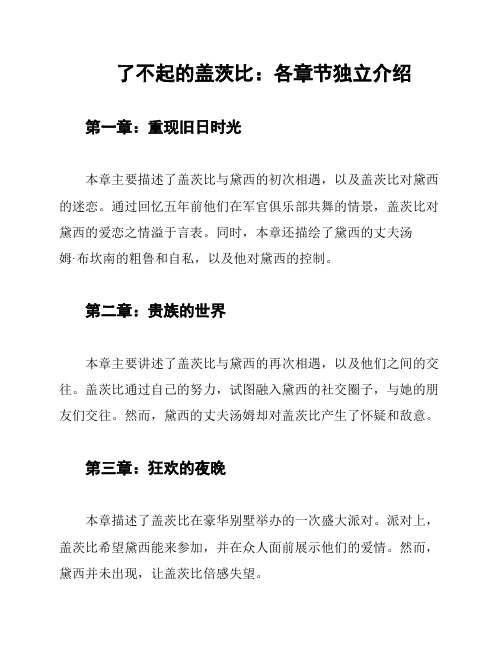
了不起的盖茨比:各章节独立介绍第一章:重现旧日时光本章主要描述了盖茨比与黛西的初次相遇,以及盖茨比对黛西的迷恋。
通过回忆五年前他们在军官俱乐部共舞的情景,盖茨比对黛西的爱恋之情溢于言表。
同时,本章还描绘了黛西的丈夫汤姆·布坎南的粗鲁和自私,以及他对黛西的控制。
第二章:贵族的世界本章主要讲述了盖茨比与黛西的再次相遇,以及他们之间的交往。
盖茨比通过自己的努力,试图融入黛西的社交圈子,与她的朋友们交往。
然而,黛西的丈夫汤姆却对盖茨比产生了怀疑和敌意。
第三章:狂欢的夜晚本章描述了盖茨比在豪华别墅举办的一次盛大派对。
派对上,盖茨比希望黛西能来参加,并在众人面前展示他们的爱情。
然而,黛西并未出现,让盖茨比倍感失望。
第四章:过去的阴影本章揭示了盖茨比与黛西的过去。
五年前,盖茨比和黛西曾有一段短暂的恋情,但后来黛西选择了汤姆。
盖茨比为了找回失去的爱情,决定改变自己的命运。
第五章:梦想的破灭本章描述了盖茨比为了实现与黛西的爱情梦想,不断努力赚钱,企图摆脱自己的出身。
然而,当他发现黛西已经习惯了贵族的生活,并且无法放弃汤姆时,他的梦想破灭了。
第六章:最后的派对本章讲述了盖茨比举办的最后一次派对。
在派对上,黛西终于出现,但她已经决定留在汤姆身边。
盖茨比为了保护黛西,选择了逃离。
第七章:悲剧的结局本章揭示了盖茨比的悲剧命运。
在逃离派对的过程中,盖茨比被汤姆指使的人杀害。
而黛西在得知盖茨比死亡的消息后,并未流露出一丝悲伤,让盖茨比的梦想彻底破灭。
第八章:残留的回忆本章通过主人公尼克·卡拉威的视角,对整篇小说进行了回顾。
尼克对盖茨比的悲剧命运感到惋惜,同时对美国社会的虚伪和道德败坏进行了批判。
《了不起的盖茨比》通过讲述盖茨比与黛西的爱情故事,揭示了美国社会的阶层矛盾和道德沦丧。
盖茨比的悲剧命运,既是他个人奋斗的结果,也是社会环境影响的产物。
这部小说成为美国文学史上的经典之作,令人深思。
《了不起的盖茨比》故事节选

《了不起的盖茨比》故事节选一、第一章在芝加哥某间小旅馆中,尼克与几个其他房客聊天时,了解到了一个名叫杰·盖茨比的传奇式人物。
他是一个神秘的百万富翁,外表英俊,却过着孤独的生活。
这让尼克很好奇,他觉得这个舞会上的神秘富翁一定有着让人惊叹的故事。
二、第二章尼克得知自己的邻居就是伟大的盖茨比,决定去拜访他。
盖茨比向尼克透露了他心中的真爱黛西。
黛西是富商汤姆·布坎南的妻子,而汤姆则有着一夜情。
尽管如此,盖茨比依旧爱着黛西,他告诉尼克,他过去的所有努力和财富就是为了重获黛西的心。
三、第三章尼克同意协助盖茨比接近黛西,安排了一场花样年华般的聚会,邀请了黛西和汤姆。
尽管聚会很成功,但这场聚会也让汤姆怀疑盖茨比的真实身份。
少数与会者是从犯罪行为中得到的财富,这个传言让盖茨比的身份逐渐变得模糊起来。
四、第四章尼克听从盖茨比之约前往他的庄园,这次盖茨比告诉他他是如何获得财富的,也解释了为什么他一周七天开着舞会。
盖茨比告诉尼克,这些舞会都是为了传达黛西对他的爱的信息,希望黛西可以前来与他见面。
五、第五章黛西来到盖茨比的庄园,两人相遇的那一刻令人动容。
不过,这个重要时刻被汤姆·布坎南的到来所破坏。
汤姆非常震惊地发现黛西和盖茨比已经开始了一段浪漫的关系。
黛西选择与汤姆回去,而盖茨比则决心去证明自己的价值,并重新赢回黛西的心。
六、第六章盖茨比向尼克透露他的过去,他的真实身份令尼克非常震惊。
他昔日曾是一个穷小子,机缘巧合下遇到了一个富有女人,并向她发誓这一生要成为一个富翁,才能与她同等对待。
而后来他获得了财富,但是她却嫁给了别人。
七、第七章汤姆意识到自己不得不保护妻子的名誉,于是下命令让人调查盖茨比的过去。
尽管黛西知道了他曾是一个穷小子,但她依旧决定离婚并开始新生活。
可是,她的坚定并不足以扭转一切,当汤姆知道盖茨比的过去后,他选择露面并公开揭露他的真相。
八、第八章盖茨比的生活以彻底的失败告终,而汤姆和黛西恢复了婚姻状态。
了不起的盖茨比第章读后感
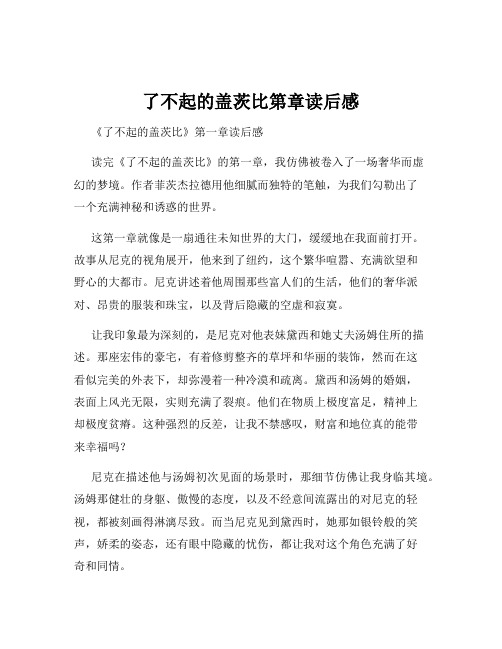
了不起的盖茨比第章读后感《了不起的盖茨比》第一章读后感读完《了不起的盖茨比》的第一章,我仿佛被卷入了一场奢华而虚幻的梦境。
作者菲茨杰拉德用他细腻而独特的笔触,为我们勾勒出了一个充满神秘和诱惑的世界。
这第一章就像是一扇通往未知世界的大门,缓缓地在我面前打开。
故事从尼克的视角展开,他来到了纽约,这个繁华喧嚣、充满欲望和野心的大都市。
尼克讲述着他周围那些富人们的生活,他们的奢华派对、昂贵的服装和珠宝,以及背后隐藏的空虚和寂寞。
让我印象最为深刻的,是尼克对他表妹黛西和她丈夫汤姆住所的描述。
那座宏伟的豪宅,有着修剪整齐的草坪和华丽的装饰,然而在这看似完美的外表下,却弥漫着一种冷漠和疏离。
黛西和汤姆的婚姻,表面上风光无限,实则充满了裂痕。
他们在物质上极度富足,精神上却极度贫瘠。
这种强烈的反差,让我不禁感叹,财富和地位真的能带来幸福吗?尼克在描述他与汤姆初次见面的场景时,那细节仿佛让我身临其境。
汤姆那健壮的身躯、傲慢的态度,以及不经意间流露出的对尼克的轻视,都被刻画得淋漓尽致。
而当尼克见到黛西时,她那如银铃般的笑声,娇柔的姿态,还有眼中隐藏的忧伤,都让我对这个角色充满了好奇和同情。
还有那场在汤姆家举行的晚宴,宾客们穿着华丽的服饰,高谈阔论,然而话题却空洞无物。
尼克在人群中显得有些格格不入,他敏锐地观察着这一切,心中充满了疑惑和迷茫。
这种感觉,我想很多人在面对不属于自己的圈子时都曾有过。
在这一章中,我能感受到尼克内心的矛盾和挣扎。
他一方面被这个纸醉金迷的世界所吸引,另一方面又对其中的虚伪和冷漠感到厌恶。
他试图在这个混乱的世界中找到自己的位置,找到真正的价值和意义。
联想到我们现实生活,不也常常被各种表面的繁华所迷惑吗?我们追求着物质的享受,却忽略了内心的需求。
就像黛西和汤姆,拥有了一切,却失去了彼此的真心和灵魂的契合。
总的来说,这第一章为整个故事奠定了基调,让我迫不及待地想要深入了解盖茨比的世界,想要知道在这看似繁华的背后,隐藏着怎样的真相和悲哀。
对了不起的盖茨比章节的深度解读

对了不起的盖茨比章节的深度解读第一章在《对了不起的盖茨比》的第一章中,我们被介绍了主要的角色和背景设定。
小说的故事发生在20世纪20年代的美国,描绘了那个时代的繁荣和堕落。
主人公尼克·卡拉威是本书的叙述者,他搬到纽约市附近的长岛居住。
他的表姐黛西·布坎南和她的丈夫汤姆·布坎南是他的邻居,他们是典型的上流社会夫妇。
尼克通过他们认识了盖茨比,一个神秘的百万富翁。
通过对尼克和盖茨比的对话,我们看到盖茨比对黛西的强烈的爱和渴望。
他的豪宅和奢侈的生活方式展示了他对黛西的追求和对物质财富的追求。
然而,尽管他的财富和地位,盖茨比仍然感到内心的空虚和孤独。
第一章通过对上流社会的描绘,展示了社会阶层之间的差距和虚荣的一面。
黛西和汤姆代表了那些追求物质享受的人,而盖茨比则代表了那些追求爱情和幸福的人。
第二章在第二章中,我们看到了更多关于盖茨比和他的过去的揭示。
尼克接受了盖茨比的邀请参加了一场豪华派对,这让他对盖茨比更加好奇。
派对的场景充满了奢华和放纵,但却缺乏真正的快乐和意义。
盖茨比本人也像一个神秘的人物,他似乎对其他人隐藏了自己的真实身份。
通过尼克的观察,我们了解到盖茨比曾经是一个贫穷的年轻士兵,但他通过一些不为人知的手段迅速积累了财富。
然而,他的财富并没有给他带来幸福,相反,他一直在追求着一个他无法拥有的梦想——与黛西重聚。
第二章深入描绘了盖茨比的内心世界和他对黛西的执着。
他的豪华生活和派对背后隐藏着他内心的孤独和失落。
第三章第三章中,我们被带入了盖茨比的世界,并了解了他为了吸引黛西而做出的努力。
盖茨比希望通过举办华丽的派对来吸引黛西的注意,他希望黛西能够看到他的财富和地位,并重新爱上他。
然而,尽管派对的热闹和繁荣,黛西对盖茨比并没有产生太大的兴趣。
她看到的只是一个追逐财富的男人,而不是曾经深爱着她的人。
第三章揭示了盖茨比对黛西的迷恋以及他为了追求她而付出的努力。
然而,尽管他的努力,黛西似乎对他已经失去了兴趣。
- 1、下载文档前请自行甄别文档内容的完整性,平台不提供额外的编辑、内容补充、找答案等附加服务。
- 2、"仅部分预览"的文档,不可在线预览部分如存在完整性等问题,可反馈申请退款(可完整预览的文档不适用该条件!)。
- 3、如文档侵犯您的权益,请联系客服反馈,我们会尽快为您处理(人工客服工作时间:9:00-18:30)。
I. F. Scott Fitzgerald, The Great Gatsby (Ware: Wordsworth Editions Limited, 1993), pp.1-16
A. Representative Passages
1. “Only Gatsby,the man who gives his name to this book,was exempt from my reaction-Gatsby,who represented everything for which I have an unaffected scorn.If personality is an unbroken series of successful gestures,then there was something gorgeous about him,some heightened sensitivity to the promises of life,as if he were related to one of those intricate machines that register earthquakes ten thousand miles away.”(3)
2. “But I didn’t call to him,for he gave his arms towards the dark water in a curious way,and,far as I was from him,I couldn’t have sworn he was trembling.Involuntarily I glanced seaward-and distinguished nothing except a single green light,minute and far away,that might have been the end of a dock.”(16)
B. Setting
1. Time: “in the spring of twenty-two” (4)
2. Location: East, West Egg, East Egg
C. Main Characters
1. Mr. Gatsby:Nick’s neighbour;wealth;“creative temperament”(3)
2. Nick Carraway
a. Background:“My family have been prominent,well-to-do people in this Middle Western city for three generation.”(4)
b. Education degree: “graduated from New Haven in 1915”(4)
c. Characteristic:“restless” (4), “literary” (5)
3. Tom Buchanan
a. Status:“had been one of the most powerful ends that ever played at New Haven-a national figure in a way.”(6)
b. Relationship:a wife called Daisy Buchanan;a mistress in New York.Nick’s college friend
c. financial status: “enormous wealthy” (6)
d. characteristics: “sturdy straw-haired man of thirty” (6)
4. Daisy Buchanan
a. Identity:Nick’s cousin;had an unhappy marriage;a three-year old girl’s mother
b. characteristic:“grey sun-strained eyes,”(9)
5. Jordan Baker:Daisy Buchanan’s friend;a slender girl;“play in the tournament” (14)
D. Episodes
1. Nick graduated from Yale and decided to learn the bond business.
2. Nick drove over there to have dinner with the Tom Buchanans and I met Jordan Baker for the first time.
3. Nick found Tom Buchanan had an affair.
E. Imagery
1. Gatsby’s mansion:“it was a factual imitation of some Hotel de Ville in Normandy,with a tower on one side”(5)
2. Nick’s house:a small eyesore
3. Daisy described Nick:“You remind me of a-of a rose,an absolute rose.
4. Tom and Daisy’s residence: “a cheerful red-and-white Georgian colonial mansion” (6)。
